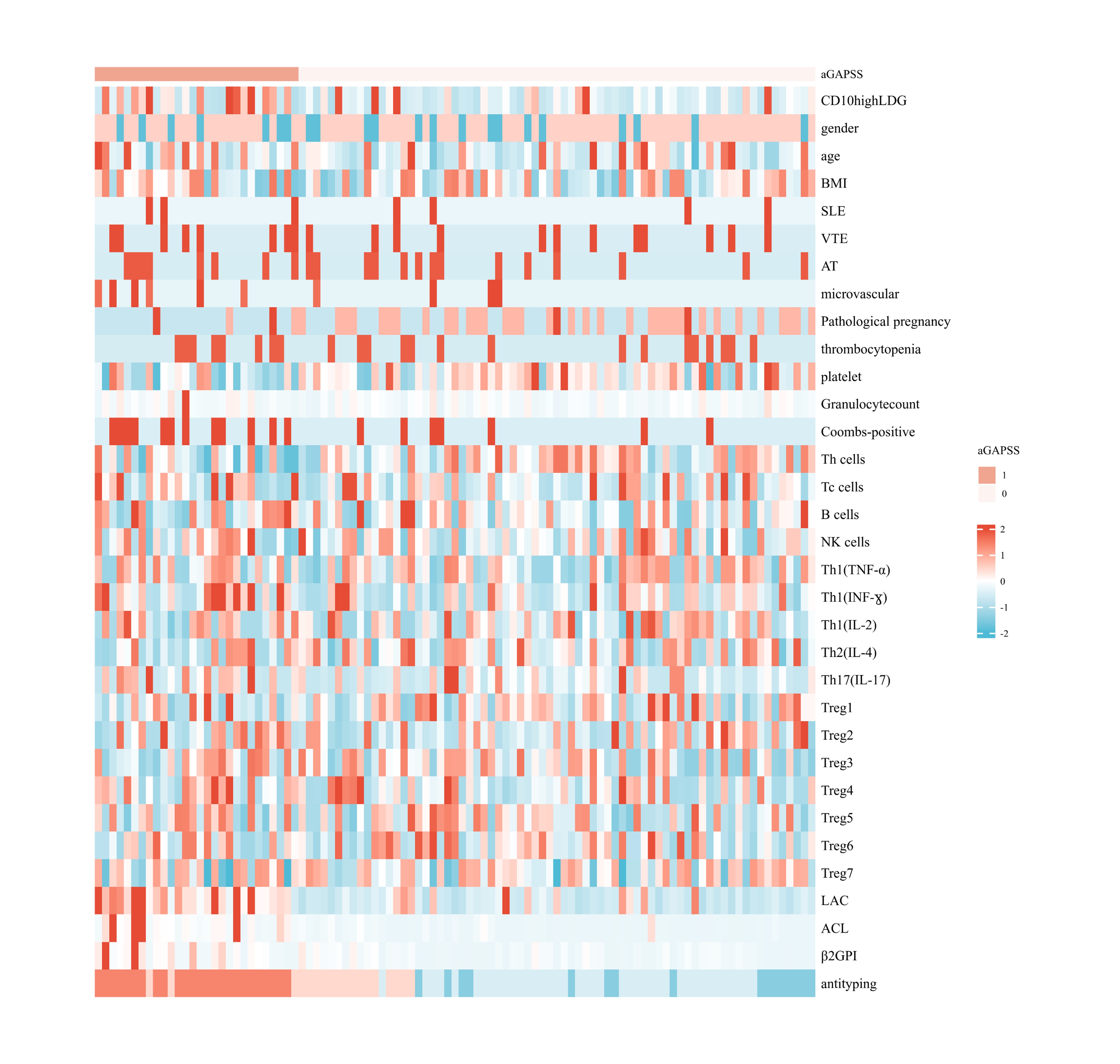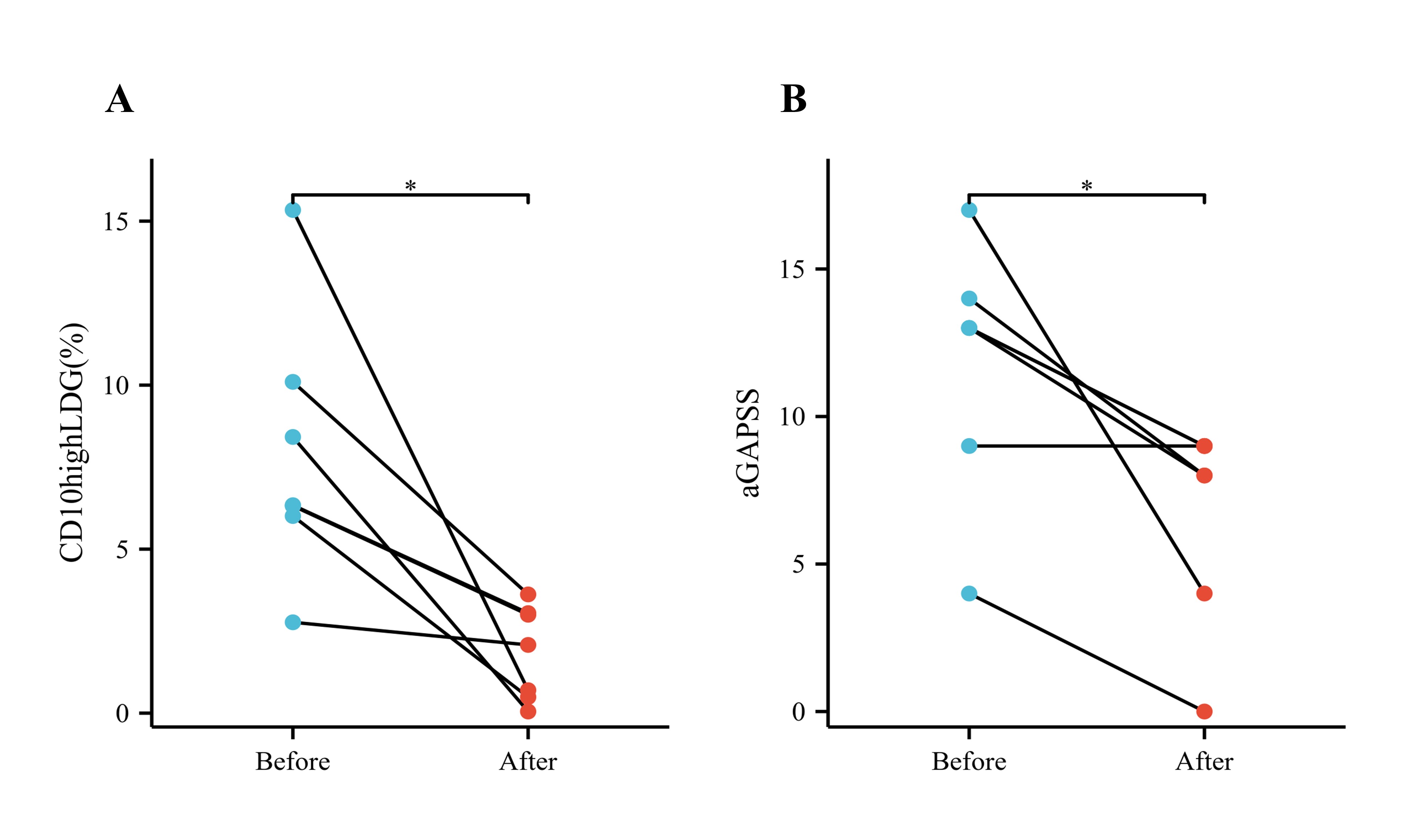Session Information
Session Type: Poster Session A
Session Time: 10:30AM-12:30PM
Background/Purpose: To investigate the relationship between CD10highLow-Density Granulocytes (LDG) and disease activity in antiphospholipid syndrome(APS).
Methods: This study included 99 patients with APS who were treated in Peking
University People’s Hospital from November 2022 to April 2024. All patients met the 2006 Sydney classification criteria for APS. At the same time, 27 healthy controls were included. Peripheral blood samples from patients and healthy controls were collected, and LDG(CD14–CD15+CD10high),T helper (Th), T cytotoxic (Tc), Tregulatory (Treg), Th1(TNF-α), Th1(INF-ɣ), Th1(IL-2), Th2(IL-4), Th17(IL-17)
B cells, and NK cells were detected by flow cytometry. The clinical data of CD10highLDG≥3.685% andCD10highLDG< 3.685% were compared. Logistic regression analysis was performed to analyze the risk factors of aGAPSS score ≥10.
Results: Patients with CD10highLDG≥3.685% had higher aGAPSS (p < 0.001), higher LAC (p =0.039), higher β2GPI (p =0.035), higher prevalence of thrombocytopenia (p =0.017), and triple-positive antiphospholipid antibody (p =0.002). Patients with aGAPSS≥10 had lower platelets (p =0.003), more patients with microvascular (p =0.037), more patients with Coombs-positive (p =0.037), higher CD10highLDG (p =0.024), higher Th cells (p =0.040), higher Th1(INF-ɣ) cells (p =0.029), lower Th2(IL-4) cells (p =0.024)(Figure 1). After treatment, CD10highLDG and aGAPSS decreased significantly in APS patients(Figure 2). Patients with deep venous thromboembolism (p =0.034), thrombocytopenia (p =0.011), SLE-APS (p = 0.041), and patients with double-positive and triple-positive antiphospholipid antibody (p =0.002) had a higher proportion of CD10highLDG.Logistic regression analysis showed that CD10highLDG≥3.685% (OR=9.895, 95%CI=4.000,98.948) were independent risk factors for aGAPSS≥10. ROC curves were drawn for CD10highLDG for disease activity,the areas under the curve was 0.645.
Conclusion: CD10highLDG≥3.685% in peripheral blood mononuclear cells of APS patients is an independent risk factor for aGAPSS score ≥10.It may be an effective indicator to evaluate the activity of APS.
Treg1:CD4+CD25highCD127low;Treg2:CD3+CD4+CD25highCD127lowCD161+; Treg3:CD3+CD4+CD25highCD127lowCD162+;Treg4:CD4+CD45RA-CXXR5+PD1+CCR7low; Treg5:CD4+CD45RA+; Treg6:CD4+CD25highFoxp3+;
Treg7:CD4+CD25-Foxp3+
To cite this abstract in AMA style:
Li c. CD10highLow-Density Granulocytes Is a Potential Marker of Disease Activity in Antiphospholipid Syndrome [abstract]. Arthritis Rheumatol. 2024; 76 (suppl 9). https://acrabstracts.org/abstract/cd10highlow-density-granulocytes-is-a-potential-marker-of-disease-activity-in-antiphospholipid-syndrome/. Accessed .« Back to ACR Convergence 2024
ACR Meeting Abstracts - https://acrabstracts.org/abstract/cd10highlow-density-granulocytes-is-a-potential-marker-of-disease-activity-in-antiphospholipid-syndrome/


